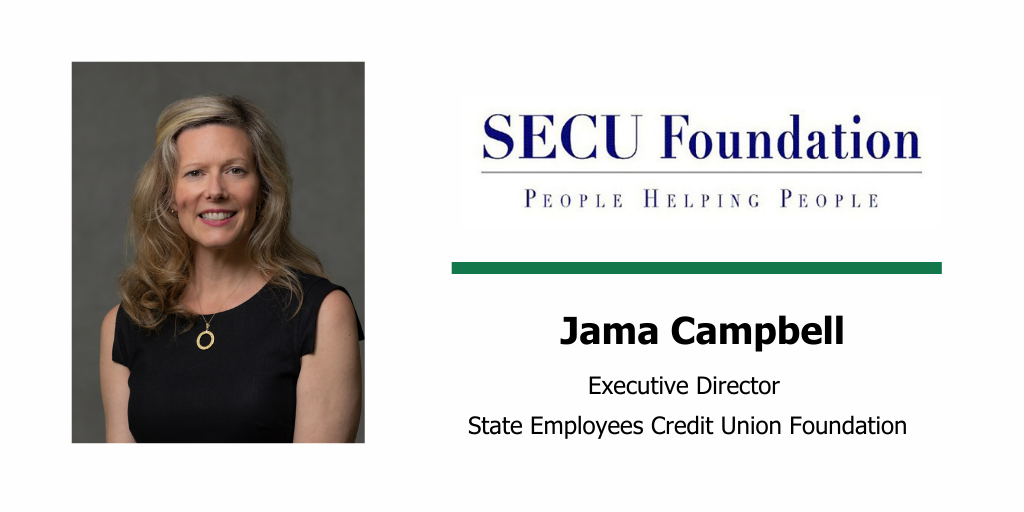Recently, Golden LEAF President, Chief Executive Officer Scott T. Hamilton sat down with Jama Campbell, Executive Director of the State Employees Credit Union (SECU) Foundation, via Zoom and filmed an episode of Critical Conversations. In this series, Scott talks with professionals about economic development issues affecting the state.
With 30 years at SECU, Campbell began her first 20 years working with the SECU branch network, advising SECU members on how to improve their finances. For the past 10 years, Campbell has served as the executive director of the SECU Foundation. Campbell said she credits working with the members across North Carolina with helping her understand the needs of SECU members and families for grant programs within the SECU Foundation.
Campbell said that about one in four North Carolinians are SECU members. The SECU Foundation was formed 20 years ago to serve North Carolina and SECU members and families. Campbell added that the SECU has branches in all 100 counties and the Foundation serves all 100 counties. She said that the SECU Foundation is a community funder, funding what the SECU members need. The SECU Foundation is funded through $1 from each of the SECU member’s checking accounts each month. She said the Foundation funding is referred to as the power of a dollar.
One of the funding priorities of the SECU Foundation is scholarships. Campbell added that the Foundation started with funding education. The People Helping People scholarship is a four-year scholarship program to help North Carolina public high school students attend college. Each of the 115 North Carolina Local Education Agencies (LEAs)/School Districts receive a minimum of one scholarship valued at $10,000 payable at $1,250 per semester for up to eight consecutive semesters for a senior to attend one of the 16 constituent campuses of the University of North Carolina System.
The SECU Foundation also has a community colleges scholarship program to assist students in each of the 58 community colleges in the North Carolina Community College System, added Campbell. There are 116 two-year scholarships valued at up to $5,000 each. Additionally, The SECU Bridge to Career program is currently available to all 58 North Carolina Community Colleges and helps remove financial barriers for students seeking state-regulated or industry-recognized credentials that lead to sustainable wage careers within their communities. Campbell said that the SECU Bridge to Career provides funding for $500 scholarships, to be awarded to up to 30 eligible students at each of the 58 NC Community College campuses.
The SECU Foundation supports internship programs as well. The SECU Public Fellows Internship program connects undergraduate students attending the state’s public universities with local leadership in order to obtain meaningful on-the-job experiences with a local agency or organization. This program also provides a unique learning opportunity to allow the SECU Public Fellows Intern to give back to his or her community. The Lead for North Carolina (LFNC) is a post-graduate fellowship program at the University of North Carolina at Chapel Hill School of Government, explained Campbell. The program aims to recruit, train, and place promising young leaders in fellowships to strengthen local governments, support communities, and create a new generation of public servants.
Another main focus of the SECU Foundation, according to Campbell, is to support disaster recovery. In the case of Hurricane Helene, SECU Foundation has provided three rounds of funding. She added that the Foundation works with some of the bigger partners such as Baptists on a Mission that works on rebuilding housing; food banks such as MANNA FoodBank located in the western part of the state; and the Salvation Army to provide services such as food, shelter, and financial assistance during disasters. Campbell added that the SECU foundation Board most recently funded some smaller nonprofits looking at resilience and sustainability after Helene.
Campbell said that a big part of what the SECU Foundation does when it comes to disaster recovery assistance is to look at what funding is available and what other funders are focusing on. She says SECU Foundation can help make a bigger impact by working in partnership with other funders.
To learn more, visit the SECU Foundation website.

